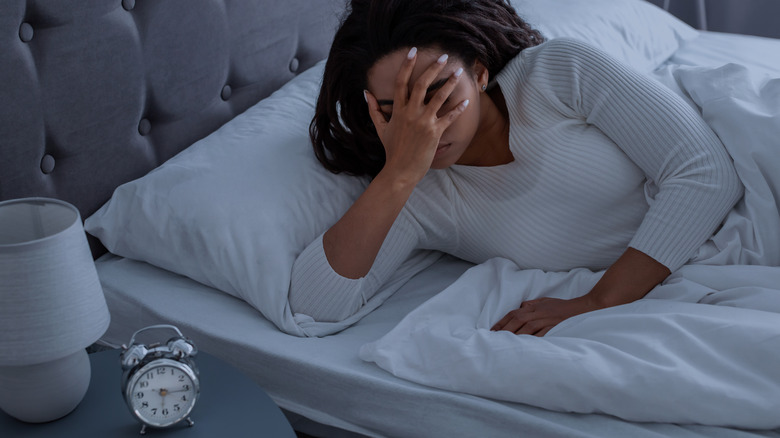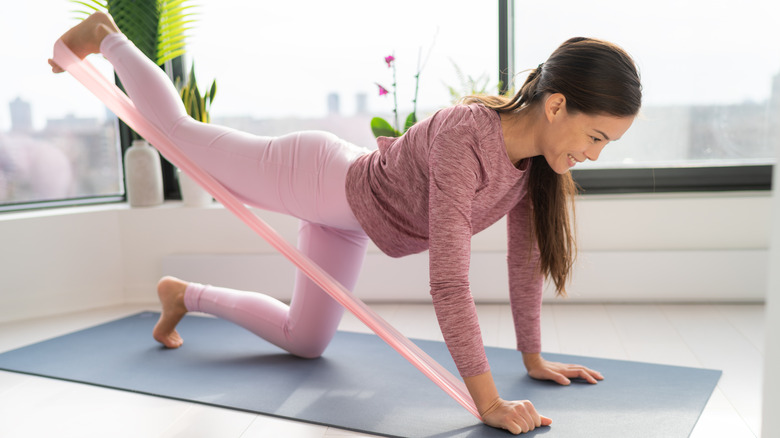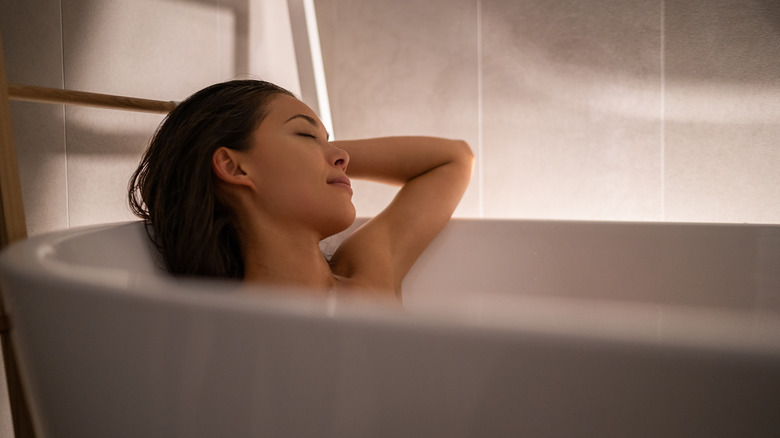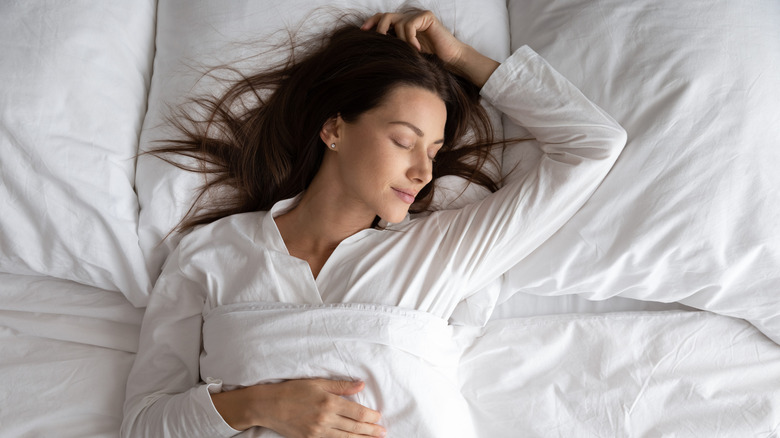How To Fall Asleep Quicker Without Medication
Do you have a hard time falling asleep? Are you constantly tired and moody? If so, it might be time to change your bedtime routine and build better habits. Sleeping pills can help to some extent, but they're not a long-term solution for insomnia. "In terms of improvement of total sleep time, the benefits of sleep medications are pretty modest," neurologist Michael Sateia told Consumer Reports. These products may also cause drowsiness, memory problems, and confusion. Plus, they are often abused or misused, which can increase the risk of side effects.
Luckily, there are things you can do to improve your sleep without taking medication. For starters, relaxation techniques before bedtime. "Life is hectic, and your brain isn't just going to flip to 'sleep mode' because the clock says it's time to go to bed," says Newport Academy founder Jamison Monroe (via Bustle). He recommends practicing deep breathing when you're ready to turn in for the night to get better rest. Meditating also can help. This centuries-old practice calms the mind and body, making it easier to doze off. In the long run, meditation can reduce insomnia symptoms and even lift your mood (per Healthline).
That's not all. Making a habit of these and some other simple practices can help you fall asleep quicker and get a full, restful night's sleep.
Get more exercise during the day
Regular exercise increases your energy and stamina, and also can lead to better sleep, according to Harvard Health Publishing. That's because physical activity boosts oxygen flow to your tissues, which in turn improves the body's ability to use energy for fuel. At the same time, it stimulates the production of feel-good hormones. Regular exercise decompresses your mind and has beneficial effects on mood, making it easier to fall asleep later in the day. "We have solid evidence that exercise does, in fact, help you fall asleep more quickly and improves sleep quality," says neurologist Charlene Gamaldo (via Johns Hopkins Medicine).
A 2021 review published in the Journal of Physiotherapy analyzed six studies conducted on more than 300 people with sleep problems. Men and women who committed to regular exercise for 10 to 16 weeks reported falling asleep faster and using sleep medications less frequently. Scientists suggest that physical activity may improve sleep quality due to its effects on energy consumption, body temperature, or the production of "feel-good" chemicals, such as endorphins.
Take a warm bath or shower
Another habit that could help you doze off faster is taking a warm bath before you lay your head down. A 2021 study conducted on more than 1,000 adults found that bathing in warm water before bedtime can reduce sleep onset latency (SOL), or the amount of time needed to fall asleep (via the Journal of Clinical Sleep Medicine). A 2019 study published in Sleep Medicine Reviews reports that taking a warm bath for as little as 10 minutes could lead to better sleep and reduce SOL.
Warm baths relax your senses and lower your core body temperature, creating an environment that promotes good sleep, explains neuroscientist Matthew Walker. "For you to get your heat out of the core of your body, you actually need to release that core heat through the outer perimeter surfaces of your body, namely your hands and your feet," he told National Public Radio.
A hot shower in the evening also will do the trick. Just make sure you go straight to bed afterward. Read a book, have a light chat, or meditate for a few minutes to put yourself in the right mode for sleep.
Try the military method
If all else fails, try the "military method" to fall asleep in mere minutes. The Independent says the technique was first described in Lloyd Bud Winter's 1981 book "Relax and Win: Championship Performance." In the book, Winter describes the technique designed by the U.S. Army to help soldiers doze off anytime and anywhere.
Personal trainer Justin Augustin describes the technique on TikTok. Simply lie down and systematically relax and shut down each part of your body, from head to toes. Start by relaxing the muscles in your forehead muscles, cheeks, and jaw, and moving down your body to your toes. All the while, be sure to take slow, deep breaths and try to empty your mind.
Once you are completely relaxed, the next step is to think of two scenarios, says Augustin. First, imagine you're lying in a canoe on a lake while watching the blue sky. Then, try to see yourself lying in a black hammock in a dark room. When your mind wanders, repeat to yourself: "Don't think." The technique should be practiced every night for six weeks. Apparently, 96% of those who master this technique manage to fall asleep just two minutes after closing their eyes.




